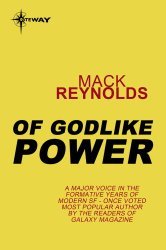Of Godlike Power – Mack Reynolds

 In Of Godlike Power
In Of Godlike Power , Mark Reynolds quipped on the consumer society (at the time of the novel, they used to call it “affluent society”) by placing in his bulls-eye the organization of work and leisure time—thus also of culture—in the capitalist system, its inequities and absurdities, the squandering of resources, brain, and so on.
, Mark Reynolds quipped on the consumer society (at the time of the novel, they used to call it “affluent society”) by placing in his bulls-eye the organization of work and leisure time—thus also of culture—in the capitalist system, its inequities and absurdities, the squandering of resources, brain, and so on.
This “critique” is conducted by the author with a lively writing full of action, dialogue, plot twists—the usual tools of the trade of a “popular” narrative such as science fiction—with an added reflection on the aberrations in our way of life. The result is a “radical” contestation, substantial, and libertarian inspired that remains a rare event in the science fiction production made in the USA.
In this regard, you might still recall some few examples: some stories of Nat Schachner, who worked mainly in the thirties and who showed a great interest in the problems of the working world; various works of Ursula Le Guin; the “Culture ” cycle of Iain M. Banks (but he’s English), with a personal vision that is vaguely anarchist. And then some works of Eric Frank Russell, and Damon Knight (The Galaxy Project
” cycle of Iain M. Banks (but he’s English), with a personal vision that is vaguely anarchist. And then some works of Eric Frank Russell, and Damon Knight (The Galaxy Project novels). And of course some other stories of the Sixties (Sheckley, Pohl & Kornbluth, Tenn, sometimes even Dick … and others).
novels). And of course some other stories of the Sixties (Sheckley, Pohl & Kornbluth, Tenn, sometimes even Dick … and others).
However satirical these writers are, even when targeting certain aspects of the pervasive “affluent society” (borrowing spree, consumerism, advertising, media excesses, the excessive power of the multinationals, the tv), at their times they were seen as isolated phenomena as if they were the only representative of new trends or new abuses. By contrast, Reynolds never mentioned the proletariat, nor the class struggle, or the Marxist superstructure, nevertheless, his satire is—in fact—”radical”, deep, and uncompromising.
Let us dwell on the plot. Ed Wonder conducts a radio program of secondary importance dedicated to phenomena like UFOs, paranormal, metempsychosis. His work led him to learn of a bizarre individual reported as potentially dangerous by the police, a certain Ezekiel Joshua Tubber. He is a preacher in search of followers to found Elisio, a community outside the consumer society, a vaguely reminiscent edition of Quakers or Amish colonies of the nineteenth-century. Tubber has a vast culture and he’s not an utopian, on the contrary, he has very concrete ideas about the world in which he wants to live.
It happens that during a dialogue between Ed Wonder and Tubber, this last starts a heated tirade against the vainglory of women that leads him to rage and throwing a kind of anathema: I now curse the vanity of women. Verily I say that never again you will find pleasure in the vanity of your person …
From that moment on, something absurd happens: wherever, women can no longer makeup and dress up as they suffer unbearable skin allergies. The phenomenon is unexplained, and only Ed can link it to the fact, as far-fetched as it can be. The story takes then a hectic trend: in successive outbursts and “curses” from Tubber, things stop functioning normally: the radio, television, and films, in the sense that people could watch or listen to media when they feature only programs that are “not frivolous”. A few days after, the curse touches publishing as well: except for the fundamental books, others become unreadable paper. It is the start of a giant landslide that expands in concentric circles to the whole society, undermined in one of its key economic components: the leisure industry. Only very selected few—in the close circle of Ed Wonder—know the real origin of the phenomenon. For everyone else what happens is incomprehensible. Somehow overcoming an initial astonishment, humanity faces a drama: nobody knows how to use free leisure time.
Cinema, radio, TV, press (what’s left), have suddenly lost value for millions, billions of people; people dangle on the streets getting drunk, fighting, destroying the environment.
What happens to a society when an exceptionally developed economic structure is not accompanied by an adequate volume of public entertainment? The average human, the individual-mass of today, is no longer able to self regulate, he’s not able to think independently about about how to spend his time. In the consumeristic society, he never had the chance. Man, so far, has evolved in such a condition that the time and available resources were handled for him by others. People worked twelve to eighteen hours a day, every day. Or starved. The time they could devote to entertainment was minimal: traditional games, dance, cinema, and other diversions were sufficient. So man never had the time to get bored. Idleness is essential to creative activity. If those who work don’t have the time to do something that goes beyond the activities needed to survive, there will be no condition for a real cultural development.
There is a moment in the novel in which Reynolds opens a discussion on the interdependence between religion and economics; the latter becomes closely knit to the curses of Tubber. This, among other things, leads the novel from the fantasy genre (which seemed to be slipped) to science fiction, or at least to dystopian genre:
Through Ed Wonder, Reynolds mulls about where religion ends and where economy begins, for him an insoluble problem. He reasons that most of the religions of the world have their bases in the economic system of their time. He takes on Judaism: When Moses established his laws, they covered every aspect of the nomadic life of the Hebrews. The same for the religion of Muhammad and Christianity. At first, he tells us, the Romans were persecuting the Christians, but they made Christianity a state religion after they realized that it was perfect for a slave society. It promised the pie in the sky after death. Suffer on earth, eat bread and water and work well, then a reward in heaven awaits you. What better faith to keep in line exploited people? Any reminiscence of Marxism?
Ed Wonder and his colleagues intuit that the capricious Ezekiel Joshua Tubber, who wasn’t fully aware of his powers and the chaos he had unleashed, as he’s holed up in his utopia in construction, could perhaps help in getting things back to normal. In a forest in the US, Elisium is being born and is already made up of dozens of enthusiasts who live a back-to-nature life, work at mansions they like, have adequate leisure time, and enjoy interpersonal relationships that are more open and genuine.
Ed decides that a new approach is possible and goes to the community, hoping that the preacher will be more malleable there and not apt to throw more anathemas. He will attempt to propose a solution.
I do not think it appropriate to reveal the ending of the novel, the result of the youth movement that emerged in the United States during the mid-1960s and spread to other countries around the world, creating the Beat Generation, Summer of Love, and the Hippie culture.
Massimo Marino is a scientist envisioning science fiction. He spent years at CERN and The Lawrence Berkeley Lab followed by lead positions with Apple, Inc. and the World Economic Forum. He is also co-founder of “Squares on Blue”, a Big Data Analytics service company.
Massimo currently lives in France and crosses the border with Switzerland multiple times daily, although he is no smuggler.
As a scientist writing science fiction, he went from smashing particles at accelerators at SLAC and CERN to smashing words on a computer screen. Is is now an author with Booktrope Publishing, LCC.
He’s the author of multi-awarded Daimones Trilogy.
His novels have received the Seal of Excellency from both AwesomeIndies.net and IndiePENdents.org
• 2012 PRG Reviewer’s Choice Award Winner in Science Fiction
• 2013 Hall of Fame – Best in Science Fiction, Quality Reads UK Book Club
• 2013 PRG Reviewer’s Choice Award Winner in Science Fiction Series
• 2014 Finalist – Science Fiction – Indie Excellence Awards L.A.
• 2014 Award Winner – Science Fiction Honorable Mention – Readers’ Favorite Annual Awards
His novels are available from Amazon, Barnes & Noble (Nook), iTunes Apple Store, and many other retailers around the world.
Join his mailing list for new releases, or follow him on Facebook, Google+, and Twitter.
The post Of Godlike Power – Mack Reynolds appeared first on § Author Massimo Marino.




